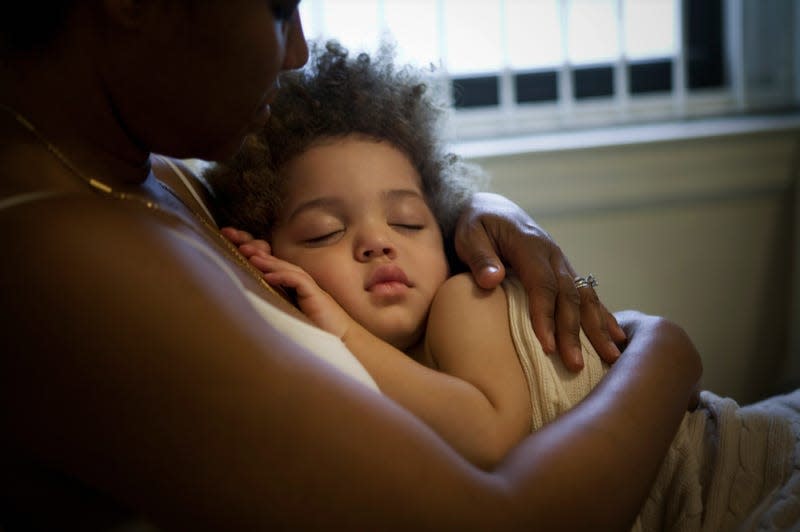“You can’t really make memories on a phone.” (Final Part)

This story was originally published by Mother Jones Magazine.
During King’s first year in prison, her children were not allowed to visit her. She was furious that Lalehparvaran had received custody of them. She didn’t think he would physically abuse them—he never had—but she worried he wouldn’t properly care for them. When they lived together, it had always been on her to hold the family together, to make sure the kids had warm coats and gloves for the winter.
Read more
When mothers are convicted of child abuse crimes, some children are sent to foster care and others to live with relatives, but it’s not unheard of for them to go to a partner or ex who was previously abusive, or to the ex’s family, according to attorneys who monitor these cases. After a mother named Ashley Garrison went to prison in Oklahoma about a decade ago for child neglect, her abusive ex-husband got full custody of the kids and prohibited Garrison from contacting them, according to Tulsa People. Garrison, in handcuffs, gave birth to another child the day she was sentenced, but the baby soon went up for adoption and her parental rights were terminated. She attempted suicide in one of the prison showers.
Fortunately, Lalehparvaran seemed to have turned over a new leaf. “After prison, he’s changed; he’s a hard worker,” said Williams, his mother. Lacking a driver’s license, he rode a bicycle to the classes he needed to get certified for his HVAC job. He made sure the kids did their homework and the chores. “I think they like living with their dad. They feel safe,” Owens, King’s mother, told me. The kids said the same thing.
But even when there’s a decent guardian to step forward, losing a parent to prison can have ripple effects. According to a study by the federal government, kids with incarcerated mothers or fathers are more likely to struggle with mental health conditions like anxiety and depression, and they face a higher likelihood of medical problems as adults, from asthma and migraines to substance abuse. Teenagers with incarcerated mothers are significantly more likely than other teenagers to drop out of school and be arrested themselves.
King tried to stay in touch with her kids however she could. She called them several times a week and wrote them letters. When Persia eventually started her period, King drew diagrams to show her how to use pads. She knitted them socks and blankets with yarn she’d bought at the commissary.
But Trinity’s adoptive guardian, Purdy’s friend, doesn’t answer when King calls. King heard that Trinity likes unicorns, so she sent her a unicorn stuffed animal. No reply. She hasn’t been able to learn much else about her daughter.
About a year into her stay at Mabel Bassett, King’s older kids were finally approved for visitation rights, and they’ve been going to meet her about once a month ever since. After Christmas, King looked forward to seeing them in January, when she hoped she and Lilah might continue their conversation. But then King and Lalehparvaran had a disagreement over the phone, and he refused to bring them. She was devastated, she tells me. After all these years, she still had so little control in their relationship and much of the rest of her life.
The day after their missed visit, I met the kids at their house in Stillwater, the same city where King grew up. That evening, they planned to celebrate Lilah’s 11th birthday. In the afternoon, they sat side by side on the couch as they flipped through an album with old family photos, giggling about how they looked as babies.
But Lilah’s cheerful demeanor faded a few hours later, when, in the privacy of her bedroom, she began to talk with me about her mother’s incarceration. It still confused her. “Like, I kind of know why she’s in jail, but I know she’s not supposed to be there,” Lilah said, beginning to cry.
“I just really miss her. I just want to talk to her,” she said, imagining what it might be like to see her mom every day, not just once a month. “You can’t really make memories on a phone.”
She composed herself and went back downstairs, where she ate dinner with her family and joined a game of hide-and-seek with her siblings. Then they all gathered around the table for cake. Lilah blew out the candles and smiled as they sang to her. Her brother, William, snuck a taste of the white icing speckled with rainbow sprinkles
Dozens of miles away, King sat in prison, missing it all. In May, her ex-husband, Lalehparvaran, was arrested and charged with burglary and reckless handling of a firearm. The kids went to stay with another relative.
Lately King wonders whether someone might take mercy and grant her a commutation, let her “get out of here, be there for them, and be the mom that I always knew that I was.” Reed, the juror who spoke with me, recently got in touch with King and apologized for recommending such a long sentence.
During one of our many conversations, I ask King what she wishes people would understand about her case. “I was just as much of a victim as my daughter was, and they should not just look at that one day,” she says. “They should look at every day and see all that I went through, and how I had gotten to the point of that day.”
More from The Root
Sign up for The Root's Newsletter. For the latest news, Facebook, Twitter and Instagram.

